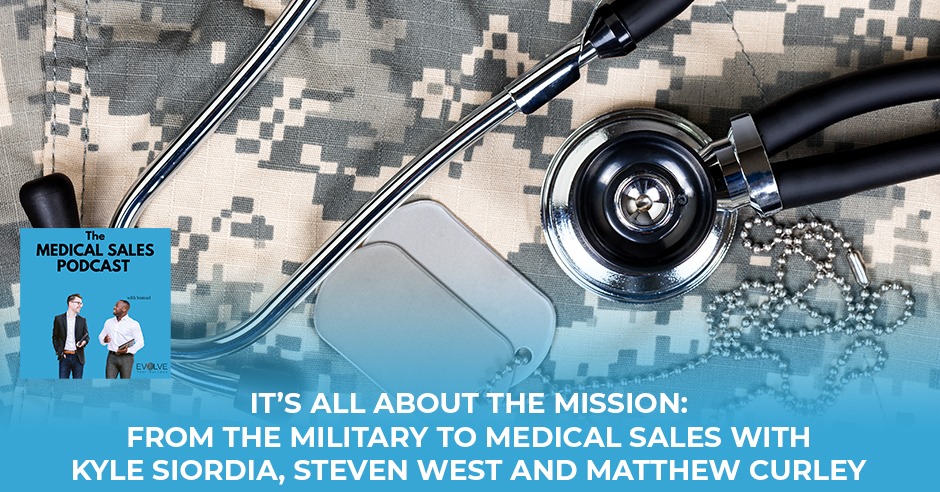
In a world where military veterans are often pigeonholed to a very limited array of specific careers, it is important to send them a message that there can be a really good career waiting for them in medical sales. A lot of things that veterans learn in the military transfer over to being an effective sales representative, an effective leader, and even an effective executive in the medical sales space. Proving that this is not only a possible, but also a desirable pathway to consider, former military officers, Kyle Siordia, Steven West and Matthew Curley have built extremely successful careers in each of their respective niches. Kyle and Matt occupy key leadership positions at Invitae while Steven works as a clinical sales specialist at Boston Scientific. In this panel interview with Samuel Gbadebo, they share how they got through their transition from military to medical sales and what other veterans can learn from their experiences.
—
Watch the episode here
Listen to the podcast here
It’s All About The Mission: From The Military To Medical Sales With Kyle Siordia, Steven West And Matthew Curley
This episode is going to be fun. This is going to be a panel interview. I have three gentlemen with me that are all from the military. I found this a very important episode to have because it’s important that veterans know that there’s a real good career out there in medical sales. A lot of things you learn in the military transfer over to being an effective sales representative and effective leader and even an effective executive in the medical sales space. These guys get into all of it. It’s not for those that had a military background or looking for an opportunity. It’s also for those people that are in sales and trying to be better leaders, trying to be better performers.
We get into all the areas that make an exceptional performer. One of these guys is the hiring manager. The other two are our sales representatives. They’re also an interesting spin on the medical sales profession because two of them are in genetic sales and another one is in device but does not sell an actual medical device. We have a lot of fun. We get into a lot of different things around how to operate at your best in this arena of medical sales. It’s something that anyone can find some value in. I hope you enjoy this episode.
—
This show is going to be interesting. For everybody reading, what’s interesting is we have three gentlemen from the military and we’re going to get into how they got into their medical sales careers, why they did it, what they do, who they are, how they do it, and it’s going to be an excellent in-depth episode. With that being said, go ahead. Anyone can start. Who are you and what do you do?
My name is Kyle Siordia. I’m a Key Account Manager with Invitae Genetics. I’m responsible for fertility sales with a reproductive endocrinologist and prenatal genetic counselors. I’m responsible for the Southeast of the US and I live in Apex, North Carolina just outside of Raleigh.
I’m Matt Curley. I work at the same company as Kyle, Invitae. I lead a team of fifteen individuals. Our team’s called The Client Relationship Management Team, but it’s essentially operations and logistics focused. We support Kyle and his folks that are in the field on a day-to-day basis. I live in Sarasota, Florida, south of Sarasota proper. I’m a Boston boy originally, but thankful to have this forum. Thanks, Samuel.
I’m Steve West. I’m based out of Nashville, Tennessee. I work for a company called Boston Scientific. My call points are urologists and radiation oncologists for a product called SpaceOAR and that’s pretty much the down and dirty of what I do.
The burning question I have is how do you all know each other?
I’ve known Matt for quite some time and I’ve known Steve a little bit longer. Steve and I served in the military together all the way from the same battery and we were in separate platoons. I met Steve in the field. We were both covered with dirt and I got thrown into a mission from a staff position. What happens is when you’re the brand new lieutenant to a unit, they send you to do PowerPoint presentations until something more fun opens up. The opportunity opened up during a field exercise. That’s where I met Steve and we immediately clicked. We did the same job, but for different platoons and we became great friends. I’ve known Matt for a few years now when we got hired on the exact same day at a small boutique genetics lab based out of Irvine, California.
I feel I’ve known Steven my entire life, even though it’s only been a few minutes. Kyle and I, on the other hand, we had an interesting beginning. The final interview for the job that we both ended up getting was at an airport. We literally flew in for the same day. We had an interview at an airport restaurant. We got hired and we didn’t know each other until we were in new hire training and we clicked. The journey’s been interesting. We’re now at another company since our first company got acquired, but the coolest thing is we’ve started a veteran’s organization at our own company to try to pay it forward and create a path for vets to come on board our genetics lab, which wasn’t a thing in existence.
As concise as you can, Invitae, what is that company? What do they do as a whole?

We’re breaking down the barriers of an industry that essentially set out to create a genetic testing pipeline for hospital systems and for patients. What we’re doing differently is we’re making that testing accessible and affordable. Historically, it has not been. It has only been for folks that have extremely good health insurance or that have the dollars in the bank to pay out of pocket. What Invitae has done is we’ve got a mission at heart that is patient-centric that has changed the way the industry looks at the way genetic testing should be perceived. We’re driving it home. We are a company that could care less about revenue necessarily. We want to help as many patients as we can on a daily basis.
Something to add about that too is you have genetics labs that they specialize in oncology or in prenatal or in cardiology or pediatrics. At Invitae, we have something pretty much for everyone. Whether you have a pediatric test or you’re going through your pregnancy journey and it’s preconception, all the way through adulthood with inherited cancer testing. We have something for everyone and we want to be that one-stop shop that when you think of genetics testing, you think of Invitae. It’s a great mission and it’s resonating out in the industry and I’m so excited to see what’s going to happen in Invitae in the next 5 to 10 years.
I want everyone to answer this, but we’ll start with Steve. What job did you have in the military? I’m not from the military, so if I say something that does not make sense, correct me, please. I’m assuming in the military, you all train and you get into it and you work yourself into a role where you have a job. I’m assuming you’re taking those skillsets into whatever the civilian life looks like when you leave the military. Steve, what job did you have? If that’s not how it works, then correct me.
You pretty much got a very good generalized view of it and especially not coming from the military. My first job and the job that I met Kyle in, I was a Field Artillery Officer, but I was more specifically a Fire Directions Officer. That’s the same role that me and Kyle shared except in separate platoons. From there, I moved into a Fire Support Officer role. From there, I moved into the S3 shop and various roles across my time in the military and also at different installations. Me and Kyle both started out at Fort Bliss down in Texas. I’ll backtrack a little bit. As the S3, you’re in charge of operations, training events, planning forums, execution, stuff like that. It’s a little bit different role than fire direction or fire support. As I was saying, me and Kyle, we both met at Fort Bliss where we shared that same role. From there, my career took me over to South Korea. From there, just North of Nashville where I’m at now to Fort Campbell, Kentucky.
Over what period of time was that?
I was in for six years. I started out as a second lieutenant and then I left the military as a captain in ‘03.
How about you, Matt? What was your job in the military? What was your stint there? How long have you been in the military and that whole thing?
Similarly, I’ve been all over the place. You’re going to find that all of us will say some semblance to that message. I started out in a pretty interesting position. I was in the Navy. I started out in counter-piracy. At the peak of piracy, we had Special Forces that were in Afghanistan, in Iraq. They called on some more conventional Navy personnel to do that role. That was my first two years. I was on ships boarding pirated vessels off the coast of Somalia, helping keep that peace over there and making sure that the shipping lanes were open. The second ship I was on was much different. I was responsible for navigation. It was more voyage planning, operations, understanding when, where and how we’re going to go to different ports around the world. Once that was over, I found myself in more of a desk job. That tends to happen after you deal with a couple of deployments in a row. I was more in an operational command center type of situation. I would say the boring stuff, most people would prefer it, but guys like us want to be out there doing things.
How long?
Seven years and two days to be honest.
[bctt tweet=”It feels good to be able to impact people’s lives on a daily basis while being compensated appropriately.” via=”no”]
How about you, Kyle?
As Steve said, I was a Field Artillery Officer. I was a graduate of the OCS program for the Army, which is one of the ways that you could become a commissioned officer in the military. You could either do officer candidate school, an ROTC program from a university, or go to one of the Academy schools, which would be a West Point for the Army and Annapolis for the Navy, which Matt and Steve both did respectively, I believe. Steve hit it on the head. We were in the same unit. I was a Fire Direction Officer for the second platoon and the job of a Fire Direction Officer is the up, down, left and right of the cannons. We do those calculations in order to fire accurately.
After that, I was moved to a platoon leader position where I was a platoon leader for quite some time. Once you move on from there, it’s either you make your way to captain’s career course, which is what you need in order to continue your career or if you say, “I’m going to get out,” you can get a desk job somewhere. That was a desk job somewhere. After I got moved up to a desk position, that’s when I figured I want to pursue a civilian life. This is where I’m at.
In everyone’s military career, you have the option to stay there or going to civilian life and you’re faced with, “What’s best suited for me?” Let me get it clear. Steve and Kyle were in the Army and Matt were in the Navy. Let me ask you this. I want you to explain if it’s not this clear cut. What’s the typical career track coming out of the military? That’s a nebulous general question. Break it down for how that question makes any sense.
At least coming from the stance of an officer, the majority of the time you’ll be not necessarily thrown into, but you’ll be marketed the operations or management positions outside of the military. I touched on this with you, Sam, in the past where coming from the background of the military, specifically as an officer, you have those roles no matter what position you’re in. Either a Piracy Officer or a Fire Directions Officer, you still have that leader role in that managerial role regardless of your MOS or position in the military. These recruiting firms know that and they try to not necessarily take advantage of that but try to push you and pursue you to take those and that course of action when you get out of the military.
That’s for officers, not for enlisted?
You could say the same for probably NCOs or enlisted soldiers as well. Having a military background, it’s an easy transition into some managerial position or even maybe a police officer. I know a lot of enlisted soldiers love taking the route of going criminal ed and then go into the policing and stuff.
I feel it doesn’t matter which service you were in. Law enforcement, some facet of that tends to be pretty common because every one of the military at some point in time is entrusted with carrying a firearm and having that responsibility and we take it incredibly seriously. Also, from an enlisted perspective, there tend to be a lot more technical trades that they go into, mostly because they have more specific specialties that officers do. Officers tend to be the jack of all trades. At one point or another, an enlisted is definitely more in tune with a specialty throughout their entire careers.
You are all officers. From what you’ve seen, is it easier to get a position being more of a jack of all trades or is it easier to get a position in civilian life being enlisted and having a specific tactical skill?
Both have their advantages. When you join the military, if you join as an officer, you understand that you’re going to be placed in a leadership position and you’re going to be responsible for soldiers and their wellbeing and the management of your battery or your company. As an enlisted soldier, when you join, you say, “I’m going to learn to be an electrician. I’m going to learn IT. I’m going to learn culinary skills,” or whatever the skill of your specific job is, mostly because you want to continue that when you get out. I know a lot of enlisted soldiers specifically in maintenance who became maintenance enlisted soldiers because when they get out, they want to be a master mechanic for BMW or whatever.

As an officer, if you talk to an officer, he’s most likely not going to get out and say, “I became an officer because I want to be a mechanic when I get out.” It’s, “I became an officer because I need to learn leadership and management skills. When I get out, I’m going to work for this company. I’m going to be a contractor,” or whatever the case may be. Both have their advantages. When you sign up, it confirms what you thought like, “This is what I want to do,” or it shows you, “This is not at all what I want to do.”
How did you find out about this career path? You’re all officers and you’re coming out of the military knowing you want to develop these skillsets and exercise the skillsets that you were able to hone while being in the military. What turned you on to medical sales?
I got to tell you, for me, it was pretty straight forward. When it came time for me to make a decision to transition out of the military, it was very clear where my career path was, and it was almost finite. On top of that, I knew exactly what my paycheck was going to look for the next fifteen years. For me, I was adamant about finding a career that I would be compensated and evaluated based on my performance. I felt it was getting to that point for me where it wasn’t going to be the case staying in the military. I’m grateful for the service. I wouldn’t change it for the world. I was looking for something where I could jump out of my comfort zone a little bit and impact people’s lives on a daily basis and for that be compensated appropriately.
For me, when I was getting out, to be honest, I didn’t know what the hell I was going to do. I went in with the plan to get military experience to be in some federal law enforcement when I get out, whether that was like State Department Security Officer, FBI, DEA, or something that. My plans changed and when I was getting out, I was thinking, “Everyone I know that’s gotten out is a logistics manager somewhere. They work at a distribution center, construction management,” things like that. My expectation was I’m going to be some middle management somewhere when I get out and these are my options. I almost went that route where I used the recruiter and the recruiter would send me these interviews. Some of them would be interesting, but a lot of them would be stuff I’m not interested in at all.
I don’t want to be a manager of a washing machine factory or the maintenance guy in charge of semi-trucks. None of that interested me. I almost signed an offer letter, but at the 11th hour, my recruiter sent me this offer and it said, “Prenatal diagnostic testing.” I was like, “One, what is that? Secondly, what do I even do?” I don’t have a science background. My undergrad was in Business. My Master’s is in National Security with a concentration in terrorism. What am I doing in OB-GYN?
It sounded interesting. They put the compensation range on your first 1, 2, 3 years, what you can expect to make in compensation. It sounded too good to be true. I gave it the opportunity and like Matt said, I flew to an airport and met the director of sales and she was amazing. I was like, “I need to work with this lady. She is awesome.” Shout out to Daphne Wood. She is the reason why myself, Matt and others within Invitae who are also veterans but came from combi are successful.
How about you, Steve?
I would say I had a bit of a combination of both reasons from Matt and Kyle. I definitely wanted to be compensated fairly, like Matt was saying. Also, when I was making my transition, I didn’t have a clue of what I wanted to do. I thought that I would fall into some management role or operations role because I felt given my background, maybe that’s what I might be most qualified for. I made the transition a little bit after Kyle and I had already seen his success. Obviously, I’ve kept in contact with him. I saw that success he had in the medical device sales world and he grew my interest and piqued it a little bit. When I was going and talking to all these recruiting firms and going into all of these hiring conferences, I told them, “This is the route I want to go.” They put me in front of those companies and by the grace of God, I eventually got a bomb job with a great company and here I am. I’m super thankful.
I’ve talked about this before, how there seems to be a trend in the sense that when I see people from a military background in the medical sales space, and when I say medical sales, I’m talking about everything and not just medical device, every type of medical sales you can be in, they excel. I’ve always wondered, is that because what you learned in the military trained you to be a great salesman or medical salesman? What would you say to any of that?
I’m a huge advocate for hiring veterans. Not even within sales or medical device, but as a baseline. You can transpose it into medical sales as well. Veterans bring a wealth of knowledge and adaptability that not any college graduate’s going to have. They’ve learned how to overcome obstacles. They have the grit. Typically speaking, they’re generally more on the go-getter side of things. That’s what widely attributes to most of their successes, whether it’s in sales, customer service or anything that they do in life. That’s my bare minimum answer there, but I could go on and on about veterans and why you should hire them.
[bctt tweet=”If you’re not in medical sales to improve the lives of the patients that you’re affecting, you should probably find a different industry.” via=”no”]
It’s a philosophical thing for me. Veterans in general are extremely comfortable being uncomfortable. On a daily basis, that’s what you’re experiencing in the field. Most often you’re going into situations where you have no idea how they’re going to turn out, but that’s our bubble. That’s our comfort zone. That’s something that we have that most others don’t. On top of that, we’re very good at blocking out 99% of the world that doesn’t matter at that point in time and staying focused on the mission. That commitment to the one thing that you can control at that point in time.
To add to what both of them said, it makes a lot of sense and there’s a lot of truth to it. As far as technical sales skills, there’s a lot that you don’t realize you’re learning in the military, but you are. You’re learning how to communicate effectively. You’re learning what is important information. You’re learning how to read people and understand their body language, what they’re getting interested in and what’s piquing their interest. We touched on it on the last show where if you’re proposing your fire support plan to your battalion commander and you layout this plan that is completely jumbled that doesn’t fit his guidance, he’s going to say, “Never mind. I’m going to call the Air Force and the sororities will take care of it.” Field artillery is stuck in the rear moving boxes around. You need to sell your fire support plan and sell what field artillery can bring to that mission or that training event or whatever that is. Show why you’re relevant.
That’s what you’re doing in medical sales. You are meeting with a doctor and showing why your product is going to provide value to their group or their clinic or their hospital system and ultimately improve the lives of their patients. That’s what we’re all here for or at least you should be. If you’re not here to improve the lives of the patients that you’re affecting, then you should probably find a different industry.
Lastly, you’re going to find loyalty with veterans when they join a company. Oftentimes, if a lot of people you do in the medical sales device or this medical sales industry, your LinkedIn probably blows up twenty times a day with such and such started position at competitor lab or competitor device. Six months later, that same person started a new position at this lab or this device company. Pretty soon, in a matter of three years, they have four positions. With at least the veterans that I know in Invitae, I don’t think anyone has left. We’re here for the long haul. We’re going to ride this thing out until we hit our escape velocity.
It sounds like when a veteran gets into a company, they’re very clear why they want to be there. Is that accurate?
For us, mission is so important. Others that are transitioning from college to careers or from career to career, mission might not be on the top of their priority list when it comes to looking for a company. I can speak for the three of us. It was hugely important. The mission has to be clear cut, good for all. If it wasn’t, I wasn’t even looking at it.
For the veterans that are reading this, not just for veterans, but for anyone reading, what would you say they should definitely keep in mind? You have all been in this career now for some time. You’ve experienced success and you’ve done well. What’s one thing like, “You might not be aware of this, make sure you’re aware of this?” What would it be?
Kyle hit the nail on the head. Making that translation of what you’re doing in your military careers, whether you’re doing what Matt did in the Navy or what Kyle did in the Army, there is that translation there. You have to make the connections when you’re making your transition out of the military into those civilian positions, into those sales roles. As Kyle was saying, you might be presenting something to a commander, but you’re giving a sales pitch. That value can be added to any company across the nation, specifically for sales, and even more specifically in Invitae like these guys have.
What’s very important to know is that as you’re transitioning out and you joined the civilian world, the stresses that you felt in the military, you’re not going to have the same stresses as you will in the civilian world, but you will have stresses. Pulling from the resiliency that you learned in the military will help you transition successfully when you find a job that is quota-driven. If you’re not pulling, it’s the 26th of the month and you’re at 78% to plan, there is going to be a different set of stresses.
Remembering your roots and your training and everything that you’ve learned and transitioning at least that aspect over into civilian life will help you greatly. I’m not going to lie. When I was getting out of the military, I thought it was going to be summer forever. When I started with CombiMatrix, I quickly realized that it is not summer forever and the civilian world can be stressful. You got to pull on everything that you learned.

I’ve got two things. First off, my message would be, don’t worry and don’t be scared. It’s going to happen. It takes time. I remember being there and it felt nothing was working out the way I wanted it to for several months and then it finally all happened at once. Keep the hope alive is the message there. Number two is a lot of us coming out of the military have had some type of leadership position one way or another. It takes some time to get back to a leadership position, for the most part. It’s not going to automatically happen on day one in your civilian life. What I would offer is for me, I had the privilege of coming back into a leadership role and I’m so grateful for it. It took time. The reason why I’m here is because I was acting as if I was a leader even though I didn’t have ‘lead’ in my title. I think for everyone coming out of the military, you’re a leader on day one whether it says or not. You got to take that to heart and own it.
Matt has done some pretty interesting things since he’s been out with our company. He’s had literally three roles. If he could elaborate on what you did at Combi then we got acquired and what stresses did you encounter there? I think he had an overlapping territory with someone so they moved him to a different position. If you want to elaborate on that, that’s pretty interesting to hear.
Being acquired, starting at a startup was very scary for us, but it’s going to wind up being one of the best days in my life for sure, even though it was very scary and challenging. I had a role at this company and when we were acquired, I lost that role based on the fact that I had essentially a neighbor with the same position in the same zip code. I was given an ultimatum, either severance or to take a little bit of a step down for a while. I did. I loved the company and the mission and believed in it so much that I took a step down for almost a full year and things started happening. I proved my value to the company and stayed loyal, even though it wasn’t maybe the best situation for me. Shortly thereafter, I got a promotion. A year after that, I got promoted to a team lead for the team I’ve been on. It happened quick, but definitely, the step back after the acquisition was hard to swallow. The comeback of the comeback is always greater.
Let me ask you this. You’ve already spoken to it. In the military, you learned how to be super comfortable in discomfort. If you could talk a little bit more about what that experience was for you when you had to step down and be in that space. What was on your mind? Was it, “I’m gunning for this, I’m going to get out of this,” or was it more of an acceptance and you’re going to continue to perform? How were you thinking of things?
It was tough. In the back of my mind, I knew that I was at a place where there was going to be expansion at some point. I knew that my time would come. That was where my mindset was. Honestly, if the mission had been lesser or their people had been lesser, it would have been an easy decision for me. I had come to love the company and the people especially so much, it was a no brainer for me. I knew it was the right thing to do at the time.
In my career, I’ve seen veterans. They are very loyal. To speak into what you have said and they do stay with companies and they excel because they’re performing and then they’re moving up. Year after year, I’ve seen them advance quickly and they’re very passionate about the positions they take on. Now that I hear you, it all makes sense. You develop this strong belief and family and camaraderie and support and staying focused and being comfortable in discomfort. Why would you go anywhere if you find a position you like? That makes a lot of sense. That’s excellent to hear. We addressed some of this, but I want to ask it anyway. This applies to anyone, not just veterans. Anyone in the type of career you have for that wants to get into the type of career you have. What is the number one contribution or the number one thing that person can do in your type of role that will make you successful? I’m going to give each of you an opportunity to give me one thing that’s most important.
I would say that the number one thing to keep in mind, what needs to be at the top of your head every day is the patients you’re serving. When you serve in the military, you serve something greater than yourself. Our mission at Invitae again is to service billions of people across the world by providing them access to their genetic information. When I meet with my providers, you have to keep that at the forefront of your mind with everything that you do. You have to always remember that these are patients’ lives that they’re dealing with. Particularly in my sector of fertility, I’m meeting with doctors who are assisting patients with achieving a lifelong goal of being parents. Being a parent myself and knowing the joy that that brings, if I can help someone achieve that by providing them the testing that we do, I’ll do it all day. I’ll work seven days a week.
I’ll take a step back. Kyle, obviously, is without a doubt the most important thing. Whenever you get into any medical sales world, the patient is always first. That’s my company’s motto. That’s my individual motto. I could probably guess that it’s Matt’s motto as well. Coming from the service, as Kyle said, that’s definitely the biggest value that you bring to a company as a veteran. You have that service-driven mindset and heart. I’ll try to specify. For me, the most important thing, and I’ll tailor it towards a transitioning vet that wants to get into the medical device or med sales space. The number one most important thing is like Matt was saying, to not worry. You’re going to be put into uncomfortable rooms with people that you’re going to be interviewing with for the first time.
You’re going to get to a company eventually. You’re going to feel like you’re all alone in this austere position that you’ve not yet come into contact with, but you’re not going to be alone. As these have already said, there’s plenty of veterans within Invitae alone. I know Boston Scientific has a ton of veterans. You’re not ever going to be alone. There’s always going to be someone there that you can lean on, another battle buddy. Maybe not from your unit that you had when you were in the service, but a veteran none the like that you’re going to be able to ask for advice, ask for help. There are so many resources out there. Do your best and be proactive. As I said, don’t worry and you’ll be all right.
What Steve said is great. If for some reason you can’t find that person that you can rely on, be that person for someone else. Be that person that they can go to and let them know. There are plenty of proactive ways you can do it. When Matt and I were at CombiMatrix, the whole sales team was essentially veterans. The mission of the CEO was to hire veterans as his sales reps. I would say all, but maybe what two of us were not veterans. When you go to Invitae, it’s the smartest people you’ve ever met in your life and we go from a 50-employee company to a 700-employee company and you feel it’s me and Matt and this giant company of non-vets. What we did, we’re like, “Let’s get a group together of veterans.”
[bctt tweet=”You are a leader from day one. Take that to heart and own it.” via=”no”]
We took this proactive approach and thank God for Invitae’s culture of wanting to include everyone and include everyone’s voice to be heard in the direction of the company. We have these things called Employee Resource Groups where if you identify with a certain group or you support that group, you can join it. You could rely on each other for exactly that, being that person to whether it’s to bounce ideas off of, to coming from a veteran perspective or you want to share stories so you don’t feel alone like you’re the only one that’s ever experienced this. We created the best in genetics employee resource group for Invitae and it’s blown up and we have big plans for it. It may be a company culture thing, but I couldn’t be happier with what we’re doing. It’s awesome.
Talking about being the dumbest person in the room, I felt like on day one when we joined, it was a roomful of brilliant humans. It was that a-ha moment like, “I got to here.” I will say what I soon learned and definitely have learned throughout 2020 and what our country and what the world’s gone through is what we bring to the table is that calming presence, as Steve was alluding to. We’re the ones that are always going to remain calm when everything else is hitting the fan, when there’s chaos all around. I tell my team this all the time, “I’ll never be the expert. I’m never going to know it all.” Probably don’t come to me for this, that or the other, but I will hold it down and I will stay calm and exude that calming demeanor in whatever situation we’re in. Across the board, that’s what’s best to bring to the table when they step in the door day one.
It’s very important for any vet reading and for anyone reading to know. Thank you so much for taking the time with us and talk about what it’s like to be in your roles to be in the medical sales space and having come from the military. If there’s anything else you’d to share with our audience, please feel free to speak.
I’ll say if you’re out there and you find me on LinkedIn and you’re a veteran that’s thinking about getting into the space, by all means, feel free to reach out, or anyone in general. Reach out to me. Sam’s got my contact. I’ll answer any questions. I’ll help you out as much as possible.
If anyone wants to find me on LinkedIn to pick my brain about questions that they have about the medical sales industry, feel free to add me. I’d be glad to talk with you. Last parting words would be to reiterate what I said. If you stay patient-focused, if you understand what you’re doing is affecting the lives of people and you keep that at the forefront of your mind, you’ll be fine.
Along the same lines as these guys have said, don’t be overly worried. Don’t have any fear. It’s going to work out and you’re going to excel and you’re going to achieve goals that you never even dreamed about, which we can all say for ourselves. It’s a battle. It’s a journey, but it’s nothing that you can’t handle. I’ll leave with this message. Many of us have been affected by suicide in some way, shape or form. The veteran community in particular is about 50% more likely to experience suicide than the general population. I want to call out, we’re all talking about reaching out to us or business type things, but we’re here to be leaned on as well. This is something that we can stop if we put some effort and commitment into it. We’re all here for you if you need to be leaned on or to be heard.
There you have it, folks. Right from the military, right from the guys in the medical cell space that understand how it all works and are doing very well in their positions and excelling in this career. Gentlemen, thank you so much for the time you spent with us.

Thanks, Sam. It’s always a pleasure.
—
Wasn’t that an interesting episode? I liked how they sounded like a group of brothers that was on a show talking about whatever. The camaraderie and the understanding of what each person has been through, you could hear it. I loved interviewing these guys. It’s nice to see that some of the things that we know make an effective sales rep and make an effective leader. Some of the basics, looking at each opportunity as a mission, having that relentless determination, those things are honed in military life. It’s easy for someone that comes out of that background to apply it into this position, into these careers, and take off. What’s great about that is it doesn’t have to only be useful for someone that had a military background. It’s useful for any of us.
When we do treat what’s in front of us like a mission, when we do have that relentless determination to do what’s required, that’s when all the magic starts to happen. That’s when we create these amazing careers, lives and experiences. Every guest I interview, I always point this out. There’s a theme that I consistently see and there’s this theme that you want to have your eyes wide open, and you want to be giving it your all in every opportunity and live that on a daily basis and be consistent with it. If you do, you’re going to create some nice things for yourself, for your career and for those you love. Life can get sweet.
If you’re looking to get into an opportunity, even if you have a military background or you do not have a military background or you’ve had a little bit of experience, or you have no experience, if you’re looking to get into a medical sales position, you need to go to EvolveYourSuccess.com and visit our site. There you can get some great direction on what you can do to get into a position. We have an excellent program called the Medical Sales Career Builder that helps people get the opportunities they’ve been looking for and get hired into the positions they want.
If you’re a sales rep and you’ve been thinking about where you want to take your own career, you want to step into a leadership position, ramp up that performance, learn how to make sense of this wild environment that we’ve been given in 2020 and make good on it so that you can say that you achieved some amazing things, visit EvolveYourSuccess.com. We have an amazing program for sales professionals to ramp up their performance and take their careers to the next levels.
Thank you for reading. I want to make sure that I’m always bringing you wonderful guests where you can learn something from and apply to the things you do on a daily basis. If anyone has any requests or has something that they know they need to hear, then make sure when you visit our website, you can go to the bottom right. It says Send Voice Recording and leave a message about what you’d like to learn in a future episode. Come back next time for another amazing episode.
Important Links:
- Invitae
- Matt Curley – LinkedIn
- Boston Scientific
- SpaceOAR
About Kyle Siordia

Key Account Manager at Invitae
IVF sales professional.
About Matt Curley
 I am passionate about servant leadership, committing to a challenge vs. doing what is comfortable and, elevating and empowering others to help unleash a team’s full potential. U.S. Naval Academy and Norwich University alum currently solving complex healthcare problems that traverse genetics and technology at Invitae.
I am passionate about servant leadership, committing to a challenge vs. doing what is comfortable and, elevating and empowering others to help unleash a team’s full potential. U.S. Naval Academy and Norwich University alum currently solving complex healthcare problems that traverse genetics and technology at Invitae.
About Steven West
 Astute, enthusiastic, proven leader with quantifiable successes. A highly adaptable critical thinker who is able to meet the needs of customers in order to provide the best possible service. Able to employ creative approaches to exceed all designated objectives and close a deal.
Astute, enthusiastic, proven leader with quantifiable successes. A highly adaptable critical thinker who is able to meet the needs of customers in order to provide the best possible service. Able to employ creative approaches to exceed all designated objectives and close a deal.
Love the show? Subscribe, rate, review, and share!
Join the Medical Sales Podcast Community today:



















































































